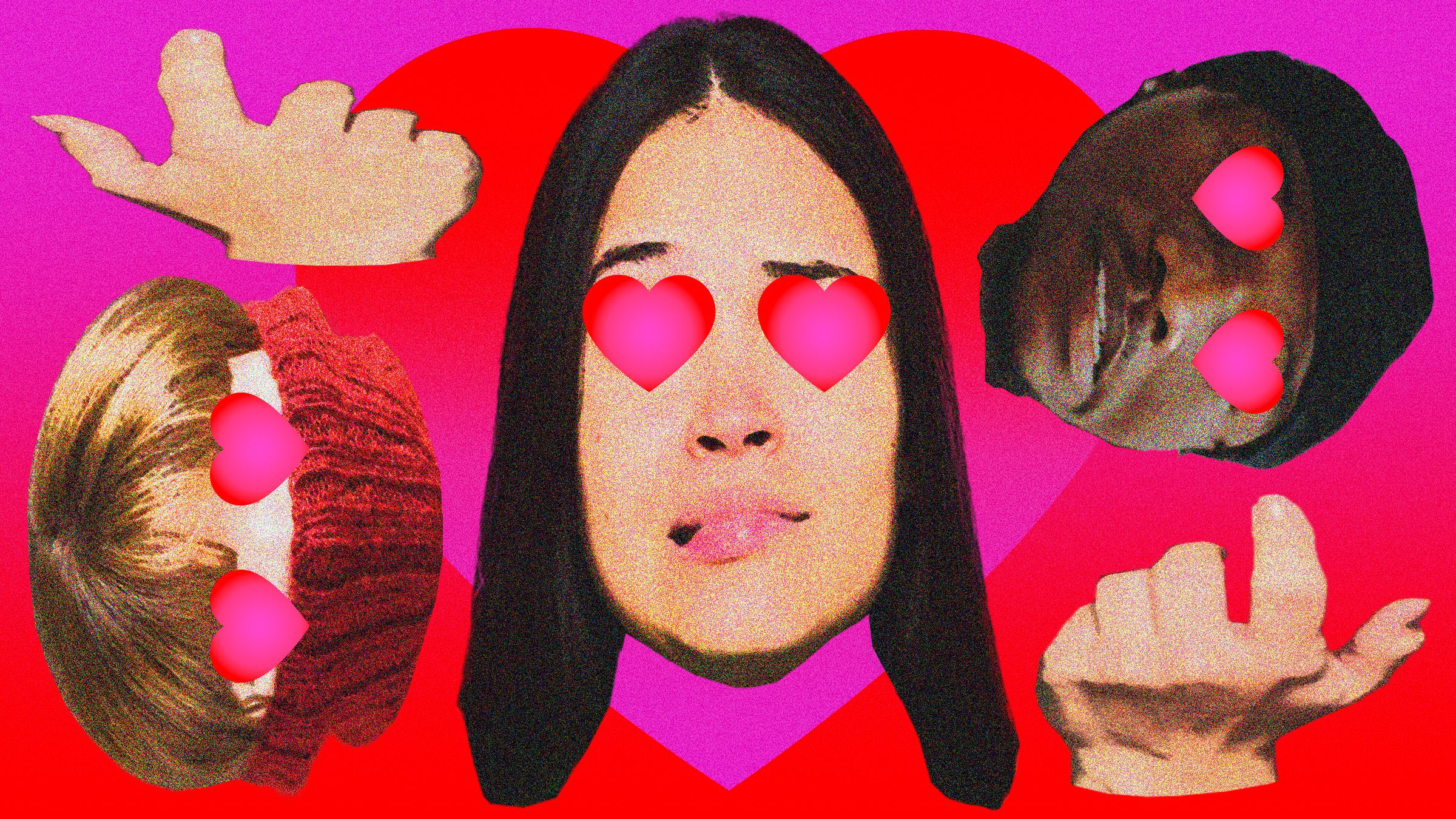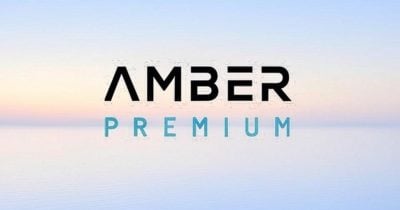When it comes to online dating, Giovanni Wolfram, a 25-year-old living in Santa Fe, New Mexico, isn’t all too worried about whether his fellow dating app users will find him attractive. Rather, his biggest fear is that he might come off as “cringey.”
“You can get away with being ugly,” Wolfram says. “But being cringey is just like—that’s a character that’s imprinted on you.” Since he first joined Hinge at 18, he has worked hard to scrub his profile of sincerity. He’s kept his responses to Hinge’s prompts sarcastic and ironic, sort of as a litmus test. Some people take his snark seriously, but those people don’t get a response from him.
“Intellectually, I’m really all about sincerity and earnestness,” says Wolfram, but he worries about “being perceived as one of those guys who is too earnest and too sincere.”
Sincerity, earnestness, irony-free declarations of contentment—these are all things many young adults edit out of their online personas. Much of what Gen Z considers “cringe” might strike others simply as directness and honesty, but one generation’s authenticity is another’s red flag. Young adults’ tendencies toward lightheartedness and jokes in their online self-presentation may point to the way many of them are dealing with feelings of vulnerability and disillusionment.
Jordan Meisel, a New York psychologist whose clientele includes college students and twentysomethings, has noticed the demographic’s reluctance toward sincerity. “I think there’s just an awareness that it’s far more vulnerable to create a persona that feels accurate to who you are as opposed to who you think you’re supposed to be or who you’d like to be,” she says.
It’s easier to make a joke, Meisel says, because when you present yourself seriously, you run the risk of there being laughter anyway—at your expense. “Emotionally speaking, you can’t hurt me if I never show myself to you,” she says.
Be Not Cringe
When Wolfram is messaging potential matches in the dating apps, it’s humor or nothing. “A lot of times I will just not be able to think of something funny enough. And the idea of being sincere is so repulsive that I just won’t answer,” he says.
Wolfram says he rarely matches with people whose profiles are “too earnest”—for example, if they share that they enjoy “lazy days in bed with a joint.”
I ask Lila Goodwillie, a 25-year-old New Yorker, whether “cringeyness” would repel her from someone’s profile. “Unfortunately, yes,” she says. “I’m not proud of that, because I feel like when I meet people in person, I kind of like nerdy guys. I kind of like guys who are a little dorky and maybe a little bit cringe,” she says.
But on the apps, her taste is distorted. “People are getting more picky,” she says. “People are getting turned off by the cringe factor.”
To illustrate this, she points out some of the famously clichéd, tired tropes she sees in dating app profiles: the guy holding a fish he caught, the “military guy,” the guy who posts shirtless selfies from the gym. Over time, she has identified more archetypes she finds cringe: the guy who writes “ask me about the time I went motor biking across Vietnam,” the guy who uses the “two truths and a lie” prompt, the voice note guy, the guy whose profile includes videos of himself playing guitar. At this point, it’s difficult to escape the fate of being slotted into one of many cringey categories.
To Goodwillie, earnestness also suggests an open-armed—and deeply uncool—embrace of dating apps as a mechanism for finding love. “My mom always says, ‘You’re going to meet someone when you least expect it,’” she says. “I kind of feel like I always have that in the back of my mind when I’m looking at profiles. I’m like, ‘Oh, I’m not taking this very seriously. I’m just going to see what happens and maybe I’ll meet someone, maybe I won’t.’ So I feel like I tend to gravitate toward the profiles that also seem like they have that same sort of casual attitude about it.”
Will Gray, 26, of Nashville is also put off by profiles he feels are too serious. He’s seen responses to Hinge prompts he interprets as too sincere, like, “What I’m looking for: a man who will always support me through thick and thin no matter what.”
“I’m being very judgmental. I guess that’s part of what the apps do—they make you judgmental,” he says.
He held his distaste for earnest responses in mind when creating his own profile. When it came time for him to answer the app’s prompts, he wanted to come off as sarcastic and lighthearted, feeling the “the threat of being too serious.” He describes his profile “semi-serious” and “somewhat sarcastic.”
“That’s partially just me not wanting to be vulnerable, or being insecure,” he says.
Long-Term Love
Gray admits that this self-consciousness can hinder young people’s ability to get what they likely want out of the apps: love and companionship. “The people bringing that serious and earnest energy, frankly, probably have the most long-term success, because they’re being open and vulnerable and earnest and clear about what they want.”
Anabelle Williams, 25 from Brooklyn, agrees with Gray that directness on the apps is probably a significant indicator of success. Her friend who indicated she was looking for a long-term relationship is now in one with someone who also clearly stated that same desire.
But in Williams’ own online dating life, someone stating what they’re looking for is “the biggest red flag I could have ever seen,” she says, describing it as “embarrassing.” “When I would see somebody saying ‘looking for a long-term relationship,’ I was like, ‘OK, you’re not looking for me. You’re just looking for anyone.”
Similarly, Liam Katz, 24, also of Brooklyn, describes sincerity on dating apps as “unnatural.” He compared an earnest-seeming online dating profile to “a picture of someone alone in front of the Statue of Liberty.”
“When you’re at a party with someone, very seldom are you going to be like, ‘Oh yeah, by the way, I don’t smoke cigarettes very often, I’m looking for a short-term relationship, and this is my sign.’ That’s not how people start talking,” Katz says. He calls that level of immediate disclosure “ridiculous.”
“Usually it starts with you kind of joking around about something,” he says. “That’s kind of lost a bit, where I think dating apps are so, like, ‘I’m looking for someone who’s this, this, and this, perfect. This person fits my match, let’s go out.’ And I think that’s kind of lame and sad.”
The culture of harsh judgment on dating apps makes users hyperaware of how they’re perceived. In the same way Katz finds others’ profiles cringe, he’s conscious about not wanting to come off that way himself. “It’s scary because you know how harshly you judge people on the app” Katz says. “We’re all doing the same thing.”
Tears for Fears
Meisel, the psychologist, finds that young adults have plenty of pejorative terms to describe sincerity. “For people who are going to college and meeting a lot of new people for the first time, a huge fear is that they’re going to come off as cringe, try-hard, pick-me. There’s just all of these weaponized terms that really control the social landscape,” she says.
Her younger patients often struggle at first to identify that it’s precisely this fear that’s getting in the way of their happiness. “It’s common that people come in feeling lonely, feeling disconnected, socially anxious, but they’re not quite sure why. And then in our conversations it becomes clear that these fears are playing an integral role in maintaining this distance from other people.”
Meisel thinks this aversion to vulnerability is related to a larger sense of disillusionment with the world. “It is very vogue to be cynical, to be pessimistic, to be an end-days thinker,” she says. “I think taking a protective stance is in line with having a cynical view of the future.”
“Vulnerability, in the form of genuineness, is the opposite of that,” she says.
In some ways, Gen Z is following in the footsteps of their elders—millennial irony was a much-discussed phenomenon of the early 2010s. But that ironic distance has given way to more sincere norms as millennials have arrived in middle age.
Wolfram finds millennials’ sincerity “revolting.” He points to how they respond to dating app prompts in the way they’re intended to be responded to. If the prompt asks the user to share their likes, for example, he often sees millennials “write two paragraphs of lists of everything that they actually like,” he says. “It’s very confusing.”
Gen Z’s fear of cringeyness might be cut from a different cloth than millennial irony. Wolfram thinks his “slice of Gen Z” is “much, much more irony-poisoned” than those just slightly younger or older, in part because the looming threat of being judged online has haunted his cohort from an early age. “A lot of it is learned,” he says. “I remember when I was a kid, I posted on Facebook this really sad-boy meme, and I got made fun of for it.”
Guilty by Association
Fully escaping the accusation of cringeyness in online dating might be a lost cause, because another cringeworthy offense, apparently, is simply being on a dating app in the first place.
“I feel like dating apps in general are already a little cringe,” says 24-year-old Manhattanite Erica Dick. She wants the profile of a prospective partner to reflect her discomfort. “There’s absolutely this idea of ‘Let us acknowledge that this is weird.’ I guess I’m looking for someone else who is feeling the same way as me.”
Since dating apps are already a tacit admission of the desire for a relationship, a profile that suggests you’re not taking the app too seriously may be part of an effort to offset the “cringe” inherent in just being there. Multiple people mentioned that, on Hinge, many list their “most irrational fear” or the “riskiest thing” they’ve ever done as “downloading this app.”
But Meisel thinks there’s hope. She sees some of her younger clients rebelling against the fear of cringe. “They’re seeing how that vulnerability and sincerity is necessary in order to create meaningful deep relationships.”



